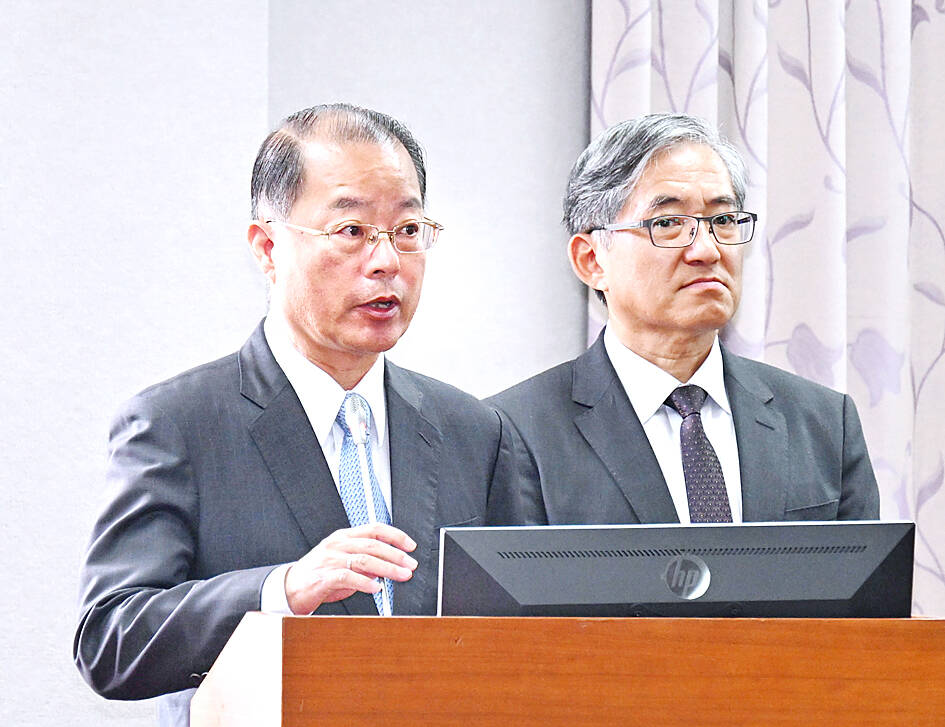Premier Cho Jung-tai (卓榮泰) has ordered that an additional 1,008 government contractors be required to undergo special vetting procedures, following a recent rise in espionage cases, the Investigation Bureau said yesterday.
That would be on top of 1,328 government employees who are subject to special security screenings, as per the Regulations on Special Vetting of Public Officials Involved in National Security or Major National Interests (涉及國家安全或重大利益公務人員特殊查核辦法).
Beijing’s intensified efforts to infiltrate the government have come to light, following several highly publicized espionage cases, including alleged spying cases involving Democratic Progressive Party (DPP) workers, such as a former aide of National Security Council (NSC) Secretary-General Joseph Wu (吳釗燮) during his tenure as minister of foreign affairs.

Photo: Fang Pin-chao, Taipei Times
The bureau and other agencies were invited to attend a meeting of the legislature’s Judiciary and Organic Laws and Statutes Committee yesterday, where proposed actions to counter China’s infiltration campaign were discussed.
The Presidential Office and the NSC did not dispatch representatives to the meeting.
Chinese Nationalist Party (KMT) Legislator Wu Tsung-hsien (吳宗憲), who presided over the meeting, criticized the two agencies for their absence.
“People should see clearly now that this government only uses the slogan ‘Oppose China and safeguard Taiwan’ to get your votes,” he said.
The two agencies cited the Constitution, saying they are not obligated to attend legislative meetings.
The bureau said that Cho ordered the increase in the number of people required to undergo special vetting, as current regulations do not include government contractors who work as secretaries or assistants for government officials who are involved in the planning and implementation of major national policies, as well as for chief secretaries or other officials of higher ranks.
Nor does the requirement apply to workers and secretaries recruited by legislators, it added.
A total of 2,336 government workers would be required to undergo special vetting in this round, including 1,328 listed in the regulations and 1,008 contractors who work as secretaries, assistants or are in positions that handle confidential information for officials in agencies of the Executive Yuan, the bureau said.
The bureau said it would propose an amendment to the Civil Service Employment Act (公務人員任用法) to bolster the legitimacy of special vetting of certain government workers, and that it plans to restrict civil servants’ and people handling key infrastructure’s trips to China.
The number of people who are to be vetted could be more than 6,000 if the requirement applies to employees at the legislature as well, it added.
Investigation Bureau Director-General Chen Pai-li (陳白立) assured lawmakers that the bureau would do its best to limit the number of people who need to be vetted.
DPP caucus chief executive Rosalia Wu (吳思瑤) said the vetting requirement must apply to employees at the Legislative Yuan, or it would risk becoming a national security loophole.
“The most feasible is for lawmakers to register their trips, which is what DPP lawmakers have been doing. However, such bills have been consistently blocked by opposition lawmakers,” she said.

The Coast Guard Administration (CGA) yesterday said it had deployed patrol vessels to expel a China Coast Guard ship and a Chinese fishing boat near Pratas Island (Dongsha Island, 東沙群島) in the South China Sea. The China Coast Guard vessel was 28 nautical miles (52km) northeast of Pratas at 6:15am on Thursday, approaching the island’s restricted waters, which extend 24 nautical miles from its shoreline, the CGA’s Dongsha-Nansha Branch said in a statement. The Tainan, a 2,000-tonne cutter, was deployed by the CGA to shadow the Chinese ship, which left the area at 2:39pm on Friday, the statement said. At 6:31pm on Friday,

The Chinese People’s Liberation Army Navy’s (PLAN) third aircraft carrier, the Fujian, would pose a steep challenge to Taiwan’s ability to defend itself against a full-scale invasion, a defense expert said yesterday. Institute of National Defense and Security Research analyst Chieh Chung (揭仲) made the comment hours after the PLAN confirmed the carrier recently passed through the Taiwan Strait to conduct “scientific research tests and training missions” in the South China Sea. China has two carriers in operation — the Liaoning and the Shandong — with the Fujian undergoing sea trials. Although the PLAN needs time to train the Fujian’s air wing and

The American Institute in Taiwan (AIT) put Taiwan in danger, Ma Ying-jeou Foundation director Hsiao Hsu-tsen (蕭旭岑) said yesterday, hours after the de facto US embassy said that Beijing had misinterpreted World War II-era documents to isolate Taiwan. The AIT’s comments harmed the Republic of China’s (ROC) national interests and contradicted a part of the “six assurances” stipulating that the US would not change its official position on Taiwan’s sovereignty, Hsiao said. The “six assurances,” which were given by then-US president Ronald Reagan to Taiwan in 1982, say that Washington would not set a date for ending arm sales to Taiwan, consult

A Taiwanese academic yesterday said that Chinese Ambassador to Denmark Wang Xuefeng (王雪峰) disrespected Denmark and Japan when he earlier this year allegedly asked Japan’s embassy to make Taiwan’s representatives leave an event in Copenhagen. The Danish-language Berlingske on Sunday reported the incident in an article with the headline “The emperor’s birthday ended in drama in Copenhagen: More conflict may be on the way between Denmark and China.” It said that on Feb. 26, the Japanese embassy in Denmark held an event for Japanese Emperor Naruhito’s birthday, with about 200 guests in attendance, including representatives from Taiwan. After addressing the Japanese hosts, Wang